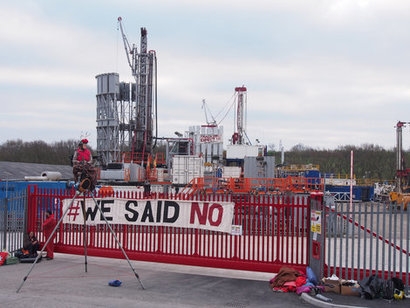
The move follows a moratorium on onshore oil and gas extraction implemented by the Scottish Government in January 2015. Its four month consultation on fracking closed on 31st May 2017 with more than 60,000 responses. Approximately 99 percent of those responses were opposed to fracking fewer than 1 percent in favour. Minister for Business, Innovation and Energy, Paul Wheelhouse told MSPs the decision followed an extensive period of evidence gathering, public engagement, and dialogue on the issue.
To put the announcement into immediate effect, the Scottish Government has now written to local authorities across Scotland to make clear that the Directions that gave effect to the moratorium will remain in place. A parliamentary vote will take place in the near future followed by a Strategic Environmental Assessment.
“The Scottish Government will not support the development of unconventional oil and gas in Scotland” Mr Wheelhouse said. “Having taken account of the interests of the environment, our economy, public health and the overwhelming majority of public opinion, the decision I am announcing today means fracking cannot and will not take place in Scotland. We have undertaken one of the most far-reaching examinations of unconventional oil and gas ever carried out by any government, anywhere. We have not taken the process or the decision lightly. At every stage we have created opportunities for discourse and debate.
Wheelhouse added that the views expressed through the consultation demonstrated that communities across Scotland, particularly in densely populated areas where developments could potentially take place, are not convinced there is a strong national economic argument when balanced against the risk and disruption they anticipate in areas, such as transport, pollution, crucially, their health and wellbeing. He said that it is clear that people across Scotland remain firmly opposed to fracking and that the Scottish Government has listened and taken decisive action.
The decision reflected the findings of economists from KPMG who estimated that allowing unconventional coal and gas extraction to take place would increase Scotland’s GDP by about 0.1 percent, but would have significant adverse environmental impacts in those sites where it would take place.
Wheelhouse told the Scottish Parliament that the Government has a moral responsibility to tackle climate change and an economic responsibility to prepare Scotland for new low carbon opportunities.
“The Scottish Government ban on fracking is a huge win for thousands of people who have campaigned against fracking for six years” said Elisabeth Whitebread, Energy campaigner at Greenpeace UK. “Unlike Westminster, Holyrood is listening to public opinion. We already have more gas than we can afford to burn, and as well as damaging the climate, fracking will cause local noise, air and light pollution.
Ms Whitebread added that announcing an outright ban and using a fair process to reach the decision meant that the Scottish Government is leading the way towards the clean energy system that people in the country want.
Image: Anti-fracking demonstrators in Chesterfield, UK
For additional information:

